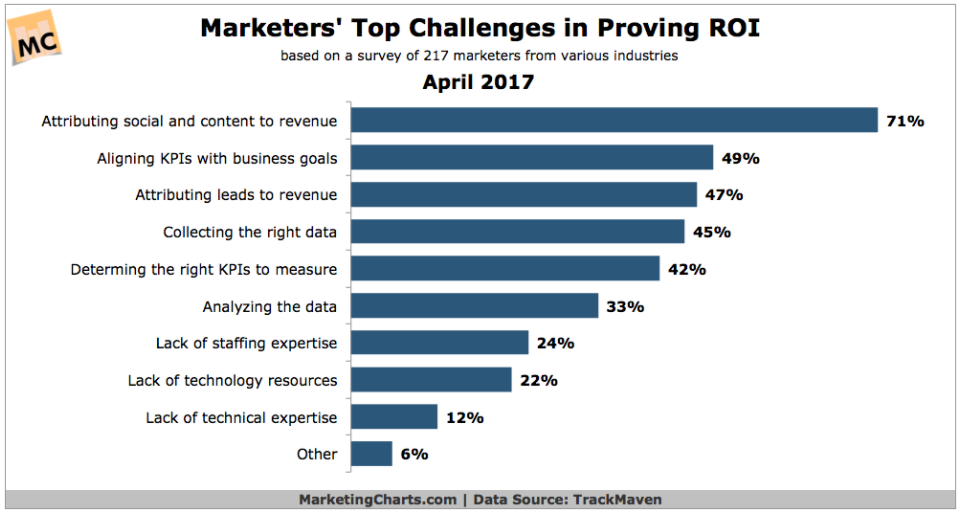 If the idea of proving social media ROI seems frightening, you’re not alone.
If the idea of proving social media ROI seems frightening, you’re not alone.
A recent marketing study found that attributing social and content to revenue continues to be a major challenge for most companies.
This latest research report surfaces insights from over 200 marketing leaders in 19 different industries on everything from the challenges they face when proving social media ROI to how they compensate their staff.
Indeed, almost three-quarters (71%) of those surveyed identified social media ROI as a challenge, far ahead of the other obstacles identified.

Misalignment contributes to Social Media ROI challenge.
It’s clear from the data that a few unsettling trends emerged around one common theme: misalignment.
When marketing is aligned with other functional units within the organization, companies see faster revenue growth and higher profitability. The glaring issue is that most marketers aren’t aware that alignment is crucial to driving business.
Get my latest business tips, exclusive content, and a bit of fun straight to your inbox with the Kruse Control Newsletter. Boost your profits with our proven advice. Sign up now – it’s free!
4 key ways that misalignment undercuts the efficacy of today’s marketers, thereby impeding social media ROI.
1. Company leaders dive into social media without a solid strategy.
Here at Kruse Control, we’ve discovered a lot of social media misdirection. It’s brought on by what we like to call, “the social media perfect storm.”
It takes two major components to turn what begins as a gentle rain, into “the social media perfect storm”:
- Business leaders with unsubstantiated assumptions about social media and its value, or lack of value, depending on their beliefs.
- Vendors perpetuating their customer’s assumptions so as to keep things status quo.
It’s easy to avoid the perfect storm. Insist on a well-developed, written social media strategy as your lighthouse. No more misalignment or guesswork, just results.
2. Companies are not measuring the necessary metrics to prove social media ROI.
KPI’s (key performance indicators) are especially crucial to social media ROI. The medium itself offers all kinds of data and tracking the right KPI’s goes way beyond “fan”, “follower” and “like” counts.
There are dozens of specific social media metrics but most of them should address one or more of the following questions:
- Are you reaching YOUR target audience?
- Are you engaging your target audience?
- How many of your social media fans are inquiring about your product or service?
- How many of them actually become customers?
3. Companies are not aligning metrics with sales goals.
61% of marketers say their focus is on increasing sales and many fall back on easy-to-measure vanity metrics such as clicks or likes instead of more relevant leads and sales metrics.
4. Companies don’t have the right analytics in place to prove marketing performance.
While 66% of marketers view analytics as strategically important and believe it’s easier to prove marketing impact today than in the past, only about 28% say they are effective at demonstrating value internally.
For marketers to demonstrate value internally (prove social media ROI), these two important factors must be aligned
- Written social media strategy to guide every piece of content published, including social ad campaigns.
- Interest/buy-in throughout the organization, from the top down.
Here at Kruse Control, we promote strategy before tactics. When your social media isn’t working, chances are tactics are being deployed without a strategy to back them up.
It’s impossible to prove social media ROI without a written strategy.
Why? Because a company must determine its unique message, its target audience, its goals and the strategy to achieve them. Skip those steps and you’re a rudderless ship searching for shore.
Creating a plan and implementing it deliberately throughout the organization closes the gap between actions and results.
Aligning KPIs with overall business goals and attributing leads to revenue are key components to a written social media strategy. Collecting and analyzing data as you’re executing your strategy allows you to tie your results back to your goals, thereby proving ROI.
Many companies are using engagement (91%) and consumption (82%) metrics to evaluate impact. Those help with the social media priorities of increasing brand awareness and customer engagement, but are harder to tie to direct revenue goals…unless you have a written social media strategy.
Proving social media ROI is a challenging endeavor but it’s totally doable.
Nothing worth having comes easy.
Critical thinking and planning are your keys to the kingdom. It’s true that the impatient or disorganized marketer will discount or ignore these keys, opting for tactics that go nowhere.
You are smarter than that.
